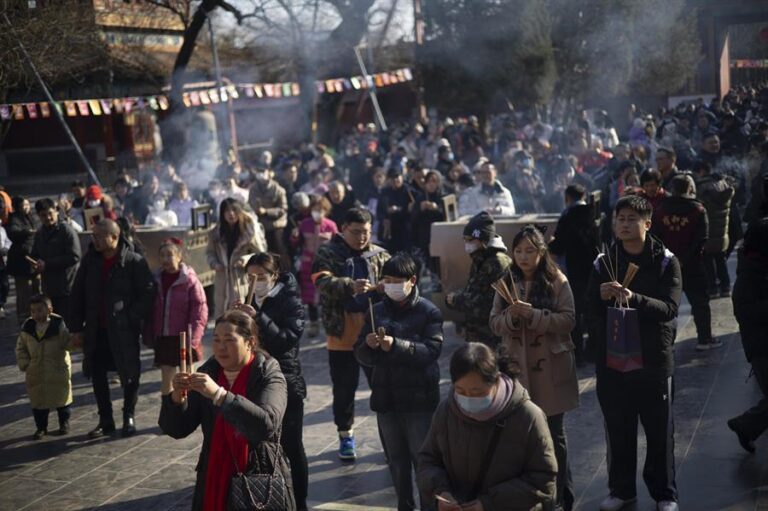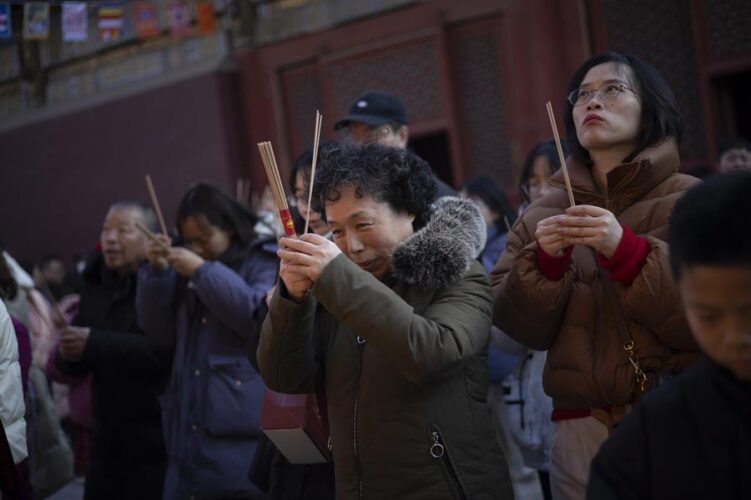
The Year of the Chinese Dragon!
Beijing, Feb 10 (EFE).- By Jesus Centeno
China on Saturday welcomed the Lunar New Year with celebrations, banquets and prayers to celebrate the Year of the Dragon, considered a symbol of power, vitality and good fortune.
In Beijing, hundreds of people went to Lama Temple in the morning to light incense sticks and accompany the Tibetan monks in their offerings, in one of the most iconic ceremonies held throughout the country to begin the so-called Spring Festival.
Meanwhile, images of dragons fill shop windows, streets and homes to comply with the custom of hanging the new zodiac sign, in this case a mythological animal revered in China for its ability to control the wind and rain to guarantee good harvests.
The dragon, which takes over from the rabbit, is worshiped in China to the point that many couples decide to have children during its zodiac year due for good auspices.
The cities also hang lanterns, almost always red, a symbol of good luck for the Chinese.
Another star of the festival are the “hongbao,” red envelopes with money inside and which are given to family and friends to wish fortune for the coming year and spread good luck to whoever receives it.
Another tradition is to set off firecrackers and fireworks, lit to scare off evil spirits, although in large cities like Beijing they can no longer be heard because they were prohibited for safety reasons and to avoid further pollution.
Practices also include hanging paper cutouts to bring good luck to the family and thoroughly cleaning the home to make room for good energy and prosperity. This month, demand for home cleaning services in China skyrocketed up to 300 percent before the arrival of the new year, a time when tradition advises getting rid of old things.
Family gatherings mean that millions of people return to their cities of origin. Authorities expect that this year there will be almost 9 billion trips made during the 40-day period known as Chunyun, in which trips are most frequent, representing an increase of 40 percent compared to last year and marking a historical record.

The celebrations are huge this year because they are the first since China relaxed and then eliminated its severe “zero Covid” strategy, which kept the country sealed tight amid extreme hygiene measures since the beginning of the pandemic.
However, some provinces have had to take extreme precautionary measures due to the poor weather forecast, with intense rain and snowfall during the holiday period, which this year falls during Feb. 10-17.
Although most businesses in the capital close over these days, there are some people who rest without leaving Beijing or work during the holidays to make good money.
Meanwhile, to greet Chinese for the holidays, President Xi Jinping gave a speech Friday night in which he acknowledged that the Asian giant has gone through a difficult time, amid “an extraordinarily complex international environment and arduous tasks in promoting reform and development, and maintaining stability.”

“We overcame a multitude of difficulties and challenges and made solid strides on the new journey to build China into a modern socialist country in all respects,” said the president.
Xi added that China has added “certainty and positive energy to a world of change and disorder,” but called for efforts to “encourage entrepreneurship and creativity” this year at a time of great economic uncertainty among the population.
The “dragon is deemed strong, fearless, benevolent and powerful, and it not only embodies the Chinese nation’s spirit of ceaselessly pursuing self-improvement, hard work and enterprise for 5,000 years, but also encapsulates the determination and aspiration of hundreds of millions of Chinese people to build China into a strong country and realize national rejuvenation,” he noted. EFE
jco/tw


